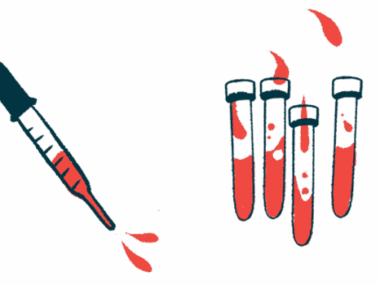Obtaining a Cushing’s Disease Diagnosis Was ‘Half the Battle’
Written by |

Welcome to “Half the Battle,” a new column about my experience with Cushing’s disease. My name is Caitlin, I’m 30 years old, and from the U.S. Northeast. I was diagnosed with Cushing’s disease six years ago. My hope for this column is that it will provide insight into what life looks like for those living with invisible conditions and dynamic disabilities.
At 20, I was studying abroad in England and found myself feeling unwell. Something didn’t feel right, but I wrote it off as being homesick. I had been living with endometriosis for several years by then, and struggling with the symptoms. However, this felt different. I was so tired that no amount of sleep seemed to satisfy my body. I figured that things would improve once I returned home, but they never did.
New symptoms began to emerge over time, but I still attributed them to the adjustment of returning home after studying abroad. I was having frequent migraines, and worsening symptoms of anxiety, brain fog, weight gain, insomnia, joint pain, and stomach issues, and the list continued to grow. Initially, I thought it must be related either to my current medication, the way I was eating, or being stressed out as a college student.
Those excuses got old over time, and after months went by, my frustrations grew. I knew something else was going on. But after several doctors’ appointments, a change in medication, and bloodwork, I still didn’t have the answers I was searching for.
This was just the start of my journey with Cushing’s disease. It would take over a year to finally learn about the disease from my own research, and then several more years to finally reach a Cushing’s disease diagnosis.
I cycled through many different specialist offices, because the symptoms I was dealing with were complex, and it was difficult to pinpoint exactly what was happening. During that period, I had also moved to three different states, which made things even more complicated. I began to track my symptoms a bit more aggressively, and created a medical binder to take to doctors’ appointments. I was in graduate school at the time, and hoping for answers so I could gain some sense of control over what was happening to my body.
I remember reading some information online about adrenal issues, which directed me toward information about pituitary and adrenal disorders. I remember thinking that these issues were rare, so there was no way it could be what was happening to me. During this period, I was also struggling with my other diagnoses, including endometriosis, adenomyosis, and interstitial cystitis. It was difficult to pinpoint symptoms and causes, but I continued to advocate for myself and search for definitive answers. I discovered a specialty center for additional consultations, and it ended up being the key to finding my answers.
It took about a year to complete all of the complex diagnostic testing and rule out other possibilities, as well as taking a break due to having surgery for my other diagnoses. Not to mention having to plan testing around my school schedule, and the fact that I was seeking medical care in another state. Finally, I was able to have a procedure done called inferior petrosal sinus sampling to help aid in my Cushing’s disease diagnosis prior to pituitary surgery. From there, we moved forward with pituitary surgery, or transsphenoidal surgery.
I was officially diagnosed surgically, and my tumor was removed when I was 25 years old, just two days after my birthday.
What was your Cushing’s disease diagnosis journey like? Please share in the comments below.
Note: Cushing’s Disease News is strictly a news and information website about the disease. It does not provide medical advice, diagnosis, or treatment. This content is not intended to be a substitute for professional medical advice, diagnosis, or treatment. Always seek the advice of your physician or other qualified health provider with any questions you may have regarding a medical condition. Never disregard professional medical advice or delay in seeking it because of something you have read on this website. The opinions expressed in this column are not those of Cushing’s Disease News or its parent company, Bionews, and are intended to spark discussion about issues pertaining to Cushing’s.







Richard Fredericks
When I was finally diagnosed with Cushing's disease, my endocrinologist estimated that I had had the disease for at least eight years. During those eight years, I was asking my then endocrinologist why I had so many bruises, why my legs were swollen, why my legs were so weak. Her reply was always, "I don't know!" When my wife finally convinced me to find another endocrinologist, I finally received the diagnosis that was missed! The new endocrinologist said I was a poster boy for Cushings Disease: excess weight around the middle of my thin body and my neck; very puffy face; bruises; swollen legs; brain fog; and blood tests that indicated very high cortisol levels. An MRI indicated a mass on my pituitary gland.
After trying a new medication to rid my body of the excess cortisol and two surgeries on the gland within two years, I am now in conferences for a radiation procedure called Cyber Knife.
After two surgeries, I still have an 8x7 adenoma which needs to be erased from my sella region.
I am hoping that the Cyber Knife procedure will free me from brain fog that continues to plague me, and constant fatigue.
The stories on the Cushing's site are both interesting and comforting. It is interesting that so many people have had the same symptoms and problems with recovery. It seems that endocrinologists and all of the doctors that we sought for help missed the rare, but obvious Cushing's diagnosis! It is very important and so obvious, that when your body is not functioning properly that you also advocate for yourself. There is so much information about symptoms and diseases on the internet. Reading and searching for the right doctor will get you the help that you need.
It takes a lot of reading and doctors' visits. I have visited many muscle specialists, osteopaths, and even infectious disease specialists, as well as endocrinologists until I finally got to the bottom of what was happening to my body. It is important not to give up. Praying and meditation helps, but then you must get off of the cushion and off of your knees and search the literature and specialists for remedies.
Norma Young
I am so, so sorry to hear how long it takes to get a diagnosis in 2022. Forty-two years ago (1980!) I had transphenoidal surgery for a pituitary adenoma which caused my Cushing disease at age 19. I was very fortunate to have a young family doctor interested in endocrine disease. He recommended me to an endocrinologist who happened to have read an article about a new technology called a CAT scan. He found an appointment for me - not that easy because there were "regional" CAT scans, smaller hospitals "fed" into a larger hospital system. The demand was huge.
After getting my results, which showed "something," my endocrinologist knew a neurosurgeon in Philly who had gone to San Diego to learn a newer surgical procedure called a "transphenoidal hypophysectomy" and wondered if I was a candidate. I was. I had surgery in August of 1980, almost exactly one year to the day of visiting my family doctor and having him ask me, "You look tired, tell me what’s going on?"
I joined a social media group for hypopit disorders a few years ago and was appalled at how long these diagnoses were taking, coupled with how long it takes post surgery to get a diagnosis of growth hormone deficiency to qualify for GH replacement! My same family doctor pointed me to a research study in 2004 taking place at Mass General. He passed it to my by-then retired endocrinologist, who passed it to his replacement, who encouraged me to participate….(here’s the part I’m leading up to) Because if he had the results of my participation, he could JUSTIFY prescribing HGH.
The only reason I received a quick (by today’s standards!) diagnosis to surgery, is because I had a family doctor who was up on endocrine symptoms, who didn’t have to wade through insurance BS, who knew an endocrinologist who heard of a new technology and didn’t have to justify using it, who knew a neurosurgeon who just learned a new procedure and didn’t have to justify using it.
The only reason I received GH therapy with minimal time-lapse or hassle is because that same family doctor, again, knew I still wasn’t 100%, and kept an eye out for research that might be helpful. And I had an endocrinologist who was willing to listen right away, and in a small practice, not totally subservient at that time to a Medical System.
I actually had far superior medical care, diagnosis, and treatment in 1980 than possible in 2022. My medical insurance, a small inter-county program, long since swallowed, paid at 98% by my employer so I paid about $20 a month for myself and my husband, covered every single visit, procedure, test, lab, surgery we had. My total bill at age 20 for was less than $300…no medical debt.
It is so disheartening to listen to struggles of the people suffering from a debilitating disease having to wander around a maze seeking a diagnosis, let alone the hurdles of justifying their treatments. It is painful to think in 42 years things have not improved, only becoming more difficult and burdensome.
My family doctor retired a few years ago, he always maintained his single practice. So far his successor seems okay.